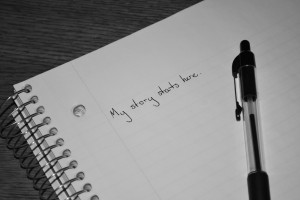Brave the Blank Page
 For a while I've felt that I should write about writing: the writing process, writing tips, the dreaded rewrite. I'm hardly an expert. I don't have a degree in writing (just a BS in biology). But I have been doing this awhile, and along the way I've come up with some things that have worked for me. W. Somerset Maugham said “There are three rules for writing. Unfortunately, no one knows what they are.” Following that sage advice, I'm not going to try to come up with rules or even guidelines. I'm just going to talk about the things I've learned and you get to listen (lucky you).
The first thing I learned about writing while writing is probably the simplest concept, but it also seems to be the hardest to implement at times. The most important thing to do to improve your writing is....write. Just write. Put words on a page. Sounds simple, doesn't it? And yet this is what trips most people up. I hear, “I want to write a book, but I don't know where to start” or “I want to finish my book, but I have writer's block.”
For a while I've felt that I should write about writing: the writing process, writing tips, the dreaded rewrite. I'm hardly an expert. I don't have a degree in writing (just a BS in biology). But I have been doing this awhile, and along the way I've come up with some things that have worked for me. W. Somerset Maugham said “There are three rules for writing. Unfortunately, no one knows what they are.” Following that sage advice, I'm not going to try to come up with rules or even guidelines. I'm just going to talk about the things I've learned and you get to listen (lucky you).
The first thing I learned about writing while writing is probably the simplest concept, but it also seems to be the hardest to implement at times. The most important thing to do to improve your writing is....write. Just write. Put words on a page. Sounds simple, doesn't it? And yet this is what trips most people up. I hear, “I want to write a book, but I don't know where to start” or “I want to finish my book, but I have writer's block.”
One of the hardest things about writing is putting pen to paper (or fingers to keyboard) when all you want to do is prance around the room in your granny panties because that's easier than staring at a blank page. Yeah, I know all about that. I've been there. Wait, you don't do that? Maybe it's just me. Regardless of how you deal with writerly insanity, blank pages are scary things. I mean, it's just sitting there waiting for you to fill it. Who wants that kind of responsibility? Well, if you call yourself a writer, then you've volunteered for it. So writers, what do we do with a blank page? Anyone? Bueller...Bueller? Well, we fill it with lovely words: poetry that captures the feel of a winter evening, fiction that takes us to new worlds, essays that teach and inspire. What do you want to add to the realm of literature?
“But I don't know where to start,” you say. Don't worry. No one else does either. Start with a sentence. I'm serious. At the top of that terrifyingly blank page, write one sentence.
The dog runs.
Look at that. There are words on that page. You've started. What next? How about another sentence?
The dog runs. But the dinosaur runs faster.
I don't know about you, but that looks like the start of a story to me.
Pantsers (people who write by the seat of their pants) probably have less trouble with this step than planners (people who plan everything before they write). I'm a tried and true pantser. I only outline if I figure out what happens next faster than I can get it on paper. But it's easy to get stuck no matter what your method. I know planners who get bogged down in the outline, wanting to plan out every detail. And they never write a word of the actual novel. Pantsers have problems too. I'll get halfway through a first draft and realize I have no clue what comes next. Or there are people like my sister, Arielle, who get words on the page, even a whole chapter, but they won't move on until what they've written is perfect.
My advice to all of them is to just write. Planners, if it never makes it onto a page, then it's never actually a novel. It's just an idea. Pantsers, do what you do best and just see what happens. Add an agoraphobic assassin, sink the pirate's ship. Run with it. Arielles of the world, write the next part. One chapter of a novel will never be perfect, only incomplete.
Once you're past that first hurdle - when the first sentence is written, and the second sentence, a whole page, a chapter, a book - you're still not done. Yes, there should be editing and revising, but I'm not going to talk about those here. What I mean is that you should still be writing. Hey, don't complain to me, you were the one who wanted to be a writer.
I finished my first novel when I was nineteen. 200,000 words (yikes), and I was so proud of my first draft, I packed it up and sent it to an editor. Here's a healthy tip: don't do this... ever. I also didn't write much for a while after that. Don't do this either. Remember when your piano teacher told you practice makes perfect? Same thing. The only way to get better at writing is to keep writing. So write. All the time. Every day if you can. Need help fitting it into a busy schedule? There are plenty of books to help. Writer Mama by Christina Katz and Pen on fire by Barbara DeMarco-Barrett are two I'm going to look up myself. A friend of mine writes a blog Writing While the Rice Boils. Trouble finding ideas? Use prompts and exercises (Writer's Digest has lots). Do research. Write another novel. Make it better. One of my critique partners likes to say, you can't edit what doesn't exist. I've written five novels over twelve years and all of them have taught me something. Things like don't send a first draft to an editor, a nd sinking the pirate ship can actually work out. Another big one was trust your readers (little sisters played a part in this one). So brave the blank page. Set off into the unknown armed with only your pen. Almost everyone wants to write a book, but only you writers will actually do it.
nd sinking the pirate ship can actually work out. Another big one was trust your readers (little sisters played a part in this one). So brave the blank page. Set off into the unknown armed with only your pen. Almost everyone wants to write a book, but only you writers will actually do it.
